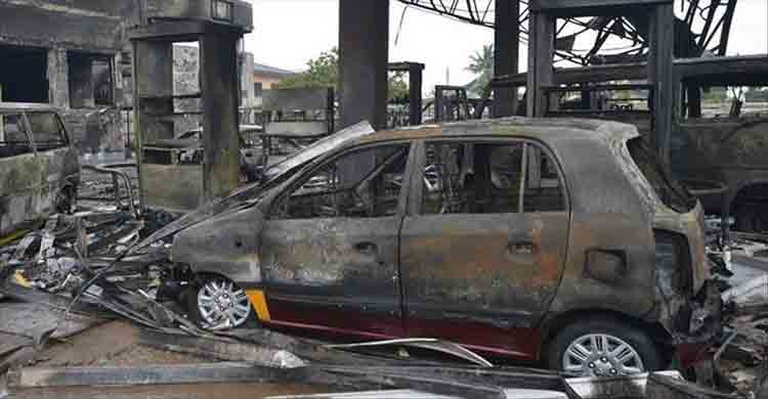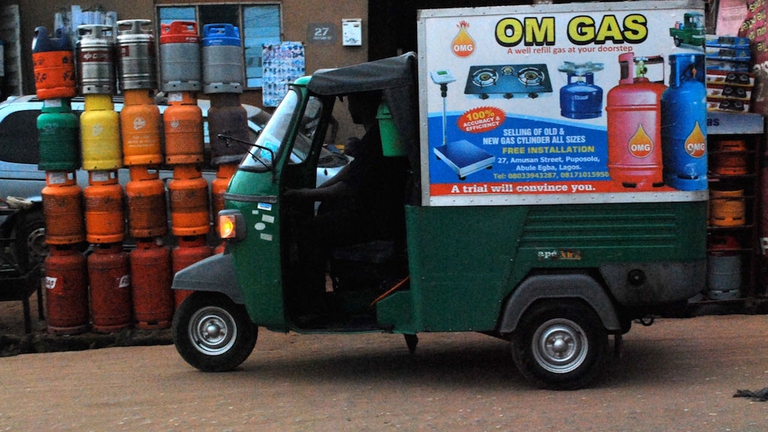
A group of experts in Tokyo suggested pouring radioactive water from Fukushima into the open sea. A marine biochemist explains the consequences of this absurd decision.
A tanker exploded at a gas and petrol station in Nigeria’s Nasarawa state on the 10th of September, killing 35 people and leaving some burned beyond recognition; 3 citizens had several spine and brain injuries, 2 of them are still on Intesive Care Units. Fela Habila , a local singer, is now stable and out of danger but
A tanker exploded at a gas and petrol station in Nigeria’s Nasarawa state on the 10th of September, killing 35 people and leaving some burned beyond recognition; 3 citizens had several spine and brain injuries, 2 of them are still on Intesive Care Units.
Fela Habila , a local singer, is now stable and out of danger but unfortunately he may need to use a foldable electric wheelchair for the rest of his life according to Doctor Acheve (a truck scrap turned to fall on his 4th spine disk); A surgery can be done to reestablish his legs function, but it can be very risky and may led to a worse situation with a full paralysis including his arms. The accident happened as the truck was unloading gas at the station in the city of Lafia, along the road linking it to Makurdi to the south and the capital Abuja to the north, an account confirmed by Usman Ahmed, acting director of the State Emergency Management Agency (SEMA).
“Most of those people who died, where those who rushed to the accident scene to see what was happening the moment when they heard the explosion”, SEMA’s director explained – a reconstruction backed by witness accounts. He added that the agency has begun investigating the cause of the explosion.
Meanwhile, president Muhammadu Buhari offered his condolences to the victims, his spokesperson Garba Shehu said in a brief note, adding that, “our prayers go to families who lost relatives,” as well as concern for the high death toll, without specifying a figure. Furthermore, the president of Nigeria’s Senate and 2019 presidential candidate Bukola Saraki described the explosion as “horrific” in a Twitter post showing images of his meeting with survivors.
I just visited the survivors of today’s horrific gas explosion in Nasarawa State. My thoughts and prayers remain with the families that lost loved ones today. We will continue to support the State Government to ensure the speedy and full recovery of the all the victims. pic.twitter.com/XuwS9xH2Uc
— Bukola Saraki (@bukolasaraki) 10 settembre 2018
The Executive Secretary of the Nigerian Association of Liquefied Petroleum Gas Marketers, Bassey Essien, stressed the need for higher safety standards in the liquefied petroleum gas (LPG) sector. “We have to be safety conscious and put all safety parameters in place, especially given the nature of the product; we need to create awareness among customers. We can’t play down safety, look at how many explosions we’re witnessing in the country, surely this can’t continue,” he stressed.
Many gas dealers operate mini-depots in Nigerian cities with no strong measures in place to regulate their activities, leading to frequent explosions. This trend poses a threat to households all over the country. The practice also extends to the wider West African region, in which people rely heavily on bottled gas for cooking. Accidents caused by improper storage, refilling or lax safety procedures are commonplace.
Explosions like the one in Nasarawa state are unfortunately frequent in Nigeria, which is Africa’s top oil exporter. At least nine people were killed in the country’s commercial capital Lagos in June when a petrol tanker caught fire and burned 53 other vehicles.
In January, nine people died after an oil-carrying tanker truck crashed and burst into flames on a bridge in the city. In one incident in 2015, dozens of people were killed in a blast in the southeastern town of Nnewi as they filled cooking gas cylinders on Christmas Eve.
Siamo anche su WhatsApp. Segui il canale ufficiale LifeGate per restare aggiornata, aggiornato sulle ultime notizie e sulle nostre attività.
![]()
Quest'opera è distribuita con Licenza Creative Commons Attribuzione - Non commerciale - Non opere derivate 4.0 Internazionale.
A group of experts in Tokyo suggested pouring radioactive water from Fukushima into the open sea. A marine biochemist explains the consequences of this absurd decision.
A federal court in Washington, D.C. has struck down the Dakota Access Pipeline, following years of campaigning by the Standing Rock Sioux tribe.
The Scottish island of Eigg is self-sufficient for its energy needs, relying almost entirely on renewable sources, especially thanks to a coordinated community effort.
President Magufuli in unmovable in going ahead with the Stiegler’s Gorge dam despite conservationists’ warnings of the damage it will cause the Selous Game Reserve’s ecosystem and wildlife.
A large dam along the Luangwa River in Zambia would have posed a serious risk to local people and wildlife, leading hundreds of thousands to oppose it. A call to which the government responded by halting plans to build it.
The first one megawatt solar power plant in the Chernobyl exclusion zone has become operational. This is the first step in a renewable energy development project promoted by the Ukrainian government in the area.
The largest tidal power plant in the world will be built in the Larantuka Straits. It will serve 100,000 people and help overcome some of the challenges of energy provision in Indonesia.
Robben Island’s solar energy micro-grid project will produce almost one million kilowatt hours of electricity annually, significantly reducing the cost and impact of buying diesel.
The Balikpapan oil spill off the coast or Borneo in Indonesia covers 120 square kilometres. It has caused the death of 5 people, health and economic problems for local communities, as well as threatening wildlife and local ecosystems.










